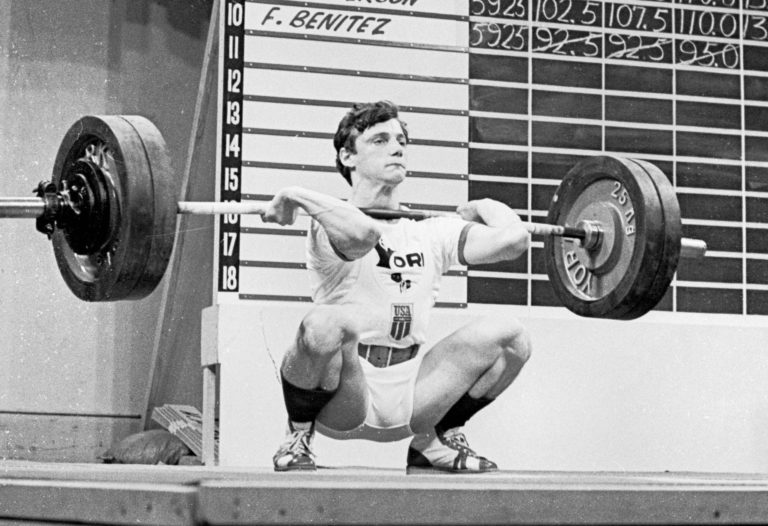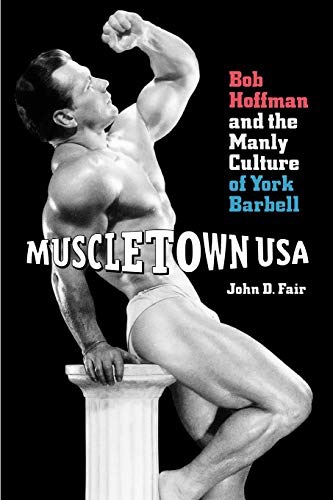Strengh Sensei Bookshelf
Muscletown USA
A look at the supplement industry and the rise and fall of the York Barbell
What the three-volume book series Muscles Smoke and Mirrors is to bodybuilding, Muscletown USA is to weightlifting.
Muscletown USA chronicles the life of Bob Hoffman, the founder of York Barbell who promoted himself as the “Father of World Weightlifting.” York Barbell played a significant role in the Iron Game by becoming a leader in the manufacturing of weightlifting equipment, pioneers in the food supplement business, and media force in promoting health and fitness.
Muscletown USA was written by John D. Fair, a history professor involved in weightlifting and powerlifting as an athlete, coach, meet director, and bodybuilding judge. His academic skills and first-hand experience in so many aspects of the Iron Game make him uniquely qualified to write this book.
York Barbell opened for business in 1932, and Hoffman used his writing skills to promote weightlifting and the use of weight training as the one true path to achieving optimal health and fitness. Its weightlifting team, the York Barbell Club, produced numerous champions who would battle for world and Olympic titles.

The York Barbell Club enjoyed a 29-year winning streak of Senior National Championships, being defeated in 1982 by Jim Schmitz’s Sports Palace weightlifting club from San Francisco. One reason for York’s success was that it sponsored weightlifters, even those who did not train at their gym in York, Pennsylvania. Weightlifting was not a popular sport during York’s prime years, and few athletes received any financial support, so many of the best lifters in the country sought to join Hoffman’s ranks.
Remarkably, most of Schmitz’s athletes held full-time jobs, only trained three days a week, and paid gym dues. American champions of today often train multiple times per day, 5-6 days per week, and can receive financial support from USA Weightlifting, the governing body of the sport. Coach Charles Poliquin also supported weightlifting with his American Record incentive program that enabled athletes to earn $1,000 for an American record, $2,500 for a Pan American record, and $10,000 for a world record.
Weightlifters from other countries also embraced the “more is better” training philosophy, and some took it to the extreme. Bulgaria, which won the team title in the 1972 Olympics over the heavily favored team from Russia, became a dominant force in the sport for over two decades. Their head coach, Ivan Abadjiev, would often have his athletes train 5x a day, 5-6 times per week! Only seven athletes have clean and jerked bodyweight, and Abadjiev coached five of them: Stefan Topurov, Neno Terziyski, Naim Suleymanoglu, Angel Genchev, Halil Mutlu.
Throughout Muscletown USA, author Fair makes the case that Hoffman’s passion for promoting weightlifting and the expense of bodybuilding did not translate into the best business practices. Bodybuilders did not like that their events were held after weightlifting competitions, often late in the evening, even though their events tended to generate larger audiences. This lead to the bodybuilding community breaking off from weightlifting to host their own competitions. It also, as Randy Roach detailed in his Muscles, Smoke and Mirrors books, opened the door for Joe Weider to become the dominant name in bodybuilding.
The creditability of York Barbell’s nutritional products was called into question as it had run-ins with the Food and Drug Administration for making misleading claims about its nutritional products. According to an article by Stephen Barrett, M.D., that he wrote for Quackwatch in 2012, on five occasions, the FDA seized Hoffman’s nutritional products. One product was Hoffman’s Energol Germ Oil Concentrate. “In 1960, the company was charged with misbranding its Energol Germ Oil Concentrate because literature accompanying the oil claimed falsely that it could prevent or treat more than 120 diseases and conditions, including epilepsy, gallstones, and arthritis. The material was destroyed by consent decree.”

Throughout Muscletown USA, author Fair makes the case that Hoffman’s passion for promoting weightlifting and the expense of bodybuilding did not translate into the best business practices. Bodybuilders did not like that their events were held after weightlifting competitions, often late in the evening, even though their events tended to generate larger audiences. This lead to the bodybuilding community breaking off from weightlifting to host their own competitions. It also, as Randy Roach detailed in his Muscles, Smoke and Mirrors books, opened the door for Joe Weider to become the dominant name in bodybuilding.
The creditability of York Barbell’s nutritional products was called into question as it had run-ins with the Food and Drug Administration for making misleading claims about its nutritional products. According to an article by Stephen Barrett, M.D., that he wrote for Quackwatch in 2012, on five occasions, the FDA seized Hoffman’s nutritional products. One product was Hoffman’s Energol Germ Oil Concentrate. “In 1960, the company was charged with misbranding its Energol Germ Oil Concentrate because literature accompanying the oil claimed falsely that it could prevent or treat more than 120 diseases and conditions, including epilepsy, gallstones, and arthritis. The material was destroyed by consent decree.”
Much of what the American public knew about York Barbell came from its two influential newsstand magazines, Strength and Health and Muscular Development. The first magazine promoted weightlifting and general fitness, and the second, bodybuilding. Hoffman was a prolific writer. Eventually, Joe Weider stepped in with his bodybuilding and fitness magazines to dominate the health and fitness media with publications of Muscle and Fitness, Flex, and Shape.
Muscles, Smoke and Mirrors set the standard of objective journalism with Roach’s meticulous research and cross-referencing of sources. Fair also put a considerable amount of research into Muscletown USA, but sometimes Fair made assumptions that were simply not true.
One example was the case of Don C. Reed, an assistant editor of Strength and Health magazine. Fair said Reed “was never an outstanding lifter” and left the York Barbell Club “disillusioned” according to Bill Starr, an elite weightlifter and former editor of Strength and Health who Fair referenced in his book numerous times.” Not quite. Competing in the 242-pound bodyweight class, Reed’s best official lifts were a standing Olympic press of 290 pounds, a snatch of 250, and a clean and jerk of 345 pounds. A 345-pound clean would be considered elite among today’s best college football linemen. As for the disillusioned comment, Reed left York because he was a skilled diver, and he left York because he was offered a good job in that profession at Sea World in Northern California. Let’s look at one more example.
Fair stated in the book that a bodybuilding competition held a Gold’s gym in York was sponsored by Joe Weider. In a comment section of a Google review of Muscletown USA, Chris Conrad wrote that Fair’s comments were not correct, “Just to set the record straight, the bodybuilding promotion had nothing whatsoever to do with Joe Weider or his publications – and in no way slighted Bob Hoffman or York Barbell – just as Gold’s Gym International had nothing to do with Joe.”
Conrad added that the competition raised money for the local Muscular Dystrophychapter in Harrisburg, and that “Many of the Barbell greats – John Grimek, Jules Bacon, John Terpak, and others attended (Bob was not well and did not attend) and were introduced to the audience. Everything was first class – there was never a mention of Joe Weider at the show. It simply was not an issue.”
Fake news errors aside, Muscletown USA provides a unique perspective into the history of weightlifting and the food supplement industry. But unlike Muscles, Smoke, and Mirrors, which gives insight into the training and nutritional practices of top bodybuilders, there is not much that, as Coach Charles Poliquin would say, “You can immediately apply to your clients on Monday.”
If you are a student of the Iron Game, Muscletown USA will be an interesting read about the rise and fall of Bob Hoffman and his York Barbell Club. As writer and philosopher George Santayana said, “Those who cannot remember the past are condemned to repeat it.”
[You can purchase Muscletown USA by John D. Fair through Amazon.com]
Join our all NEW Dojo of Strength for combat sports training, women’s health & fitness, & monthly programs and articles from Charles Poliquin and our team of coaches.
